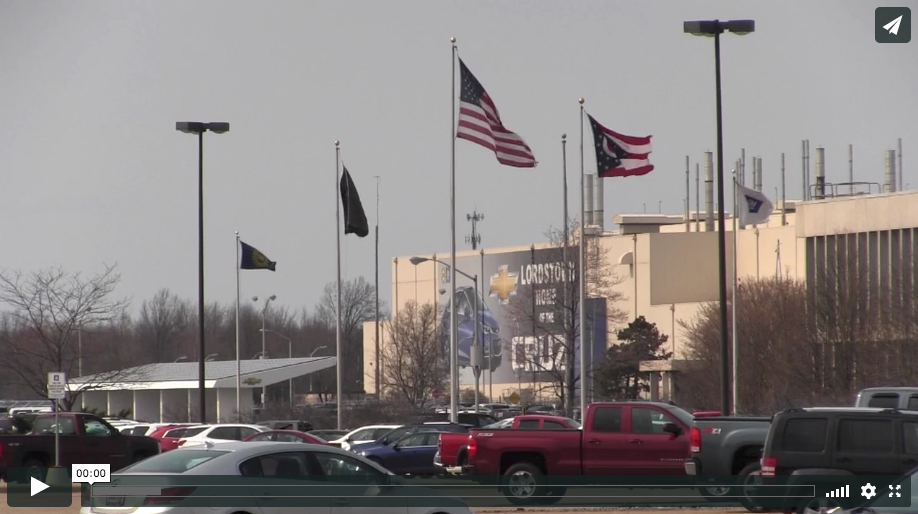GM Lordstown Suspends 2nd Shift; Buyouts Offered
LORDSTOWN, Ohio – General Motors Co.’s announcement Friday afternoon that it would eliminate the second shift at its Lordstown Complex drew a mixture of anger, uncertainty, and even optimism from plant employees.
“They’re going to try and minimize the hurt as much as possible,” said Carrie Raupach, a 40-year employee who joined some 3,000 workers assembled for the announcement that the manufacturing complex would be reduced to a single shift. “They’re going to offer buyouts to some of the older workers there,” she said.
The second shift will end when the car rolls off the line June 15.
Employee buyouts could amount to as much as $60,000, said Raupach as she was exiting the parking lot of the plant. Smaller buyouts could be made available for those with less seniority to encourage them to leave the company.
About 1,500 employees could be affected by GM’s decision, but Raupach said the number of actual layoffs would be less because she suspects a large number of employees eligible for retirement will accept the buyout.
“I went to our retirement classes and there were a lot of people there,” she said. The incentives should only encourage more to leave through attrition. Raupach noted that she plans to retire.
 GM Lordstown employee Carrie Raupach says she’ll accept a buyout.
GM Lordstown employee Carrie Raupach says she’ll accept a buyout.
Raupach, who audits vehicles as they roll off the assembly line, said those eligible for the buyouts would receive more information next week.
GM’s Lordstown complex produces the Chevrolet Cruze, a small car once a strong seller among fuel-efficient sedans. Over the last 18 months, however, low gasoline prices empowered buyers to forsake vehicles such as the Cruze for larger crossovers, trucks and SUVs.
Sluggish sales of the Cruze forced GM Lordstown to cut its third shift last year, affecting some 800 employees. The market has since suffered further declines, pushing the company to reduce production of the Cruze to better align with demand.
“As the market continued to undergo huge changes, it required us to reduce production rates and take numerous down weeks to match production with lower customer demand for compact cars,” GM said in a statement. “As we look at the market for compact cars in 2018 and beyond, we believe a more stable operating approach is to match market demand on a one-shift schedule.”
The automaker said lower fuel prices and an improving economy contributed to a shift in buying trends, but emphasized that GM remains committed to producing vehicles for the small-car market.
“The car market remains important to GM and Chevrolet since it represents 36% of industry retail sales. The small car segment also brings new and conquest customers to Chevrolet,” the company said.
In March, Cruze sales fell 13.4% to 16,122 units sold, making it the 11th straight month of sales declines. In 2017, 184,751 Cruzes were sold, down from the model’s peak sales of 273,060 in 2014.
While Raupach acknowledged reducing the workforce to a single shift will hurt, she suspects the plant is in a strong position to rebound and win production of an entirely new vehicle — not unlike the Buick crossover she was driving.
Other employees were less confident — some even infuriated at GM’s actions.
“I’m sick of this,” vented Michael McNamara, who stands to lose his job. “I’ve been transferred three times over the last five years.”
 Michael McNamara says he’s been transferred three times in five years and now stands to lose his job at GM Lordstown.
Michael McNamara says he’s been transferred three times in five years and now stands to lose his job at GM Lordstown.
McNamara said he is frustrated because executives made no mention of dislocated employees being offered positions in other plants. “All I can tell you is there are going to be a lot of people out of a job,” he said.
Another worker who declined to give his name said he is upset over the loss of the second shift, but realizes there’s little he can do. “There’s nothing I can do to change anything,” he said as he drove out of GM Lordstown’s exit gates.
The loss of the second shift would impact hundreds of jobs at auto suppliers — such as nearby Magna Seating and Johnstown Industries here and others across the state.
U.S. Rep. Tim Ryan, D-13, Ohio, linked the timing of GM’s announcement to the EPA’s determination April 2 that rolled back fuel economy standards for trucks and SUVs.
“I am deeply disappointed by today’s GM Lordstown announcement,” Ryan said in a statement. “While low gas prices encourages the decline of compact car like the Chevy Cruze, President Trump’s intention to weaken fuel economy standards is putting his thumb on the scale in favor of the larger cars and SUVs made elsewhere. He claimed he was against the government picking winners and losers, and yet he goes against the very region and state that helped put him in office. As these layoffs are implemented, I will do everything in our power to assist the affected employees and their families get through this difficult time.”
U.S. Sen. Sherrod Brown, D-Ohio, said GM should use the massive windfall it expects to receive from recent tax cuts to protect Ohio jobs, instead of eliminating them.
“GM cannot pocket billions of dollars in tax cuts and turn around and fire Ohio workers whose livelihoods depend on these jobs,” Brown said. “I expect GM to tell Ohioans immediately how they plan to use their tax windfall to keep Ohioans in their jobs.”
U.S. Sen. Rob Portman, R-Ohio, said he called senior executives at General Motors today to express his hope that the “company will reinvest in the plant and in the workforce.” Portman added he will “do what I can to help bring new work to the plant. We will also do everything we can to help workers who are laid off with the appropriate resources during this transition.”
Lordstown Mayor Arno Hill said the elimination of the second shift will surely impact the village’s income tax base, but emphasized that his administration is prepared for weathering these bumps.
“We’re going to lose revenues, but we have prepared for this,” he said. “We’re hoping things will be straightened around in a year or two. Eventually, the small car will come back.”
 Lordstown Mayor Arno Hill says the village will weather the storm of lost tax revenue from the layoffs.
Lordstown Mayor Arno Hill says the village will weather the storm of lost tax revenue from the layoffs.
Hill said when the third shift was eliminated it cost the village upwards of $1 million in tax revenue. This recent reduction, he estimated, probably won’t be as bad, since the third shift was also putting in maximum overtime hours.
“I don’t think it’ll be similar,” he said. “But our income will definitely drop. We’ll survive and we’ve planned for it.”
Hill said he’s optimistic about the plant’s future. “We’ve shown that we could build a quality product — management and leadership of the union. In the long run, we’ll be OK,” he said. “This is a speed bump, one we don’t like to see but one we have to deal with.”
Since a significant number of the plant’s employees live in other communities, the elimination of the third shift will impact their tax revenues.
“People don’t realize how much all our local economies are connected,” said Warren Mayor Doug Franklin. “There’s no doubt it will have a negative impact when you talk about a whole shift.”
Just how much of an impact the reduction would have is unknown, Franklin said. “When there’s an announcement of a new product, I know we’ll be in the running.”
Trumbull County Commissioner Frank Fuda said eliminating the second shift would cause a reduction in consumer spending across the county, and therefore impact sales tax revenues.
“When people are working, they spend money,” he said. “If they’re not working or making the money that they normally make, they’re going to spend less money and that’s going to affect the sales tax.”
Copyright 2024 The Business Journal, Youngstown, Ohio.



